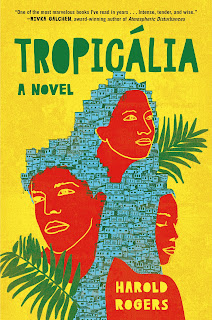Harold Rogers is the author of the new novel Tropicália. Also a boxing coach and stand-up comedian, he lives in New York City.
Q: What inspired you to write Tropicália, and how did you create your characters Daniel, Lucia, and Maria?
A: The characters in the book started out as silhouettes of me and my family, and I even put the Cunha family in the same building where I spend much of my childhood in Rio. And I started thinking counterfactually about some of the aspects of my life.
Like what if my American dad had left my Brasilian mom in Rio? What if rather than a twin sister, I had a younger sister whose paternity is in question? And from those points, the story and the characters really started to develop a life of their own.
I loved writing all these characters, especially because with each one I got to access a different tone and with that different language and syntax. Like Daniel is rompy and fun—though his levity catches up to him. While Lucia is so smart and responsible and concerned about being good. And Maria is villainous and very bleakly funny—I think I liked writing from her perspective the most.
And the majority of the book came together during and just after the pandemic when I was away from Rio for longer than I had ever been and two of my family members there died. And so living in the book and in my memories of Rio was a wonderful reprieve.
Q: The writer Rivka Galchen said of the book, “Intense, tender, and wise, and it reminds us that for each way that a family is split, it is also doubled; and that for each fury, there is a resplendent underside of love.” What do you think of that description?
A: I think the way that Rivka describes fury and love as like obverse sides of the same coin gets to the heart of the complicated nature of family that I was trying to express in this story. The difficulty of loving especially people that have an arbitrary but much stronger moral claim on you.
Like if someone keeps hurting you over and over again, you probably would want to just stop associating with them. but if that person is your mother or your brother, it's more complicated.
And I think in this book, there is a shared experience of pain in this family, and like for example, Daniel and Lucia, who are both hurt by their mother, I think toward the end of the book they come to understand that they have to be some sort of support for each other.
Q: Did you know how the novel would end before you started writing it, or did you make many changes along the way?
A: The novel changed a lot over the course of its composition. It went through many, many, many (many… many) different drafts. I knew it was about Daniel and Lucia and Maria right from the get go. And then I kinda arbitrarily chose a structure: three parts, 12 chapters, with each part starting with Daniel.
But in terms of the plot, I just knew that I wanted chaos to ensue on the New Year's Eve celebration in Copacabana, which is like the most bustling time of the year in Rio. And once I knew what happened in the middle of the book: the big explosion, then I found out how to write my way there and resolve it.
Q: As you mentioned, the novel centers around Rio de Janeiro--how important is setting to you in your writing?
A: I think one of the things I like the most as a reader is when a book is acutely rooted in a place because I think whatever that place is with all its sights and smells and disparate humanity exudes through and becomes a part of the story.
So Rio is vital to this story. And it is such a marvelous, difficult, vibrant city that if it is well captured in writing, then the writing will be extremely alive. I hope I succeeded in giving it a true textured representation.
Q: What are you working on now?
A: Another novel. It's coming along, but I don't like talking about anything until I have at least a good draft finished. Don't wanna jinx it!
Q: Anything else we should know?
A: I've gotten a lot of questions about how I chose to tag dialogue in the book. Some chapters have no dialogue tags at all while other chapters the dialogue is marked with an em dash.
The chapters that remain unmarked are because these are meant to represent more oral accounts, everything is something the character is speaking, and the oral accounts in this book are meant to be less reliable.
The dialogue that is tagged with an em dash is done so because that is the default dialogue tag in Brasil (not quotation marks) and so these are the written accounts of the book, the ones that are supposed to be official or more reliable. And there's a whole family lineage thing going on with how the dialogue tags are used.
--Interview with Deborah Kalb


No comments:
Post a Comment